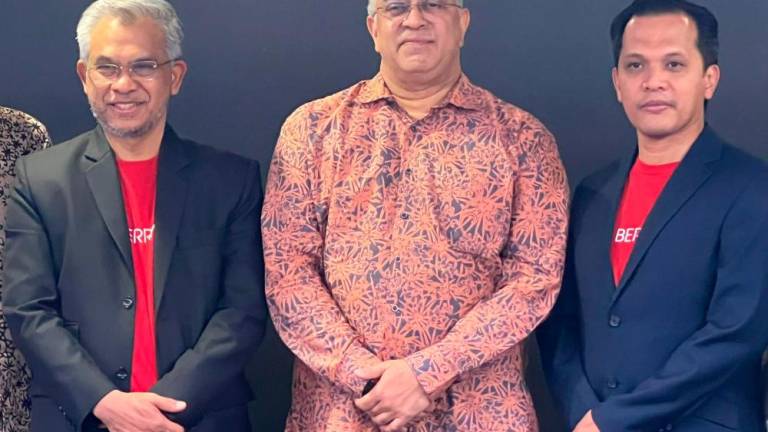KUALA LUMPUR: Sunway Medical Centre Velocity (SMCV) launched its ‘Sooner Than Expected’ campaign aimed at addressing the fear and doubts about advanced surgical procedures while dispelling the misconceptions harboured by the public.
In its statement today, SMCV acknowledged the public’s curiosity and apprehensions about advanced surgical procedures, saying it aims to use the campaign to showcase the transformative surgical practice of robotic surgery, providing quicker recovery, and enabling patients to resume normal daily life as soon as possible.
“With this ‘Sooner than Expected’ campaign, SMCV offers immersive experiences, giving everyone a better understanding of how minimally invasive surgeries are conducted. This will be shown through a series of tour video series featuring the da Vinci Xi Surgical System and the Mako SmartRobotics™️ Robotic-Arm Assisted Surgical System in action.
“The series will also feature tours of other SMCV facilities and services, including the operation theatre and rehabilitation centre, dedicated to maintaining the overall well-being of patients as they recover from surgery,” it said.
It added that SMCV will host the ‘Shaping the Future of Surgery’ exhibition from June 12 until July 13 2024 which is open to the public. Visitors will have a chance to experience how robotic, open incision and keyhole surgeries are conducted through virtual reality (VR) simulations.
By providing a first-hand experience of how these surgeries work, SMCV hopes to help alleviate patients’ concerns while providing a deeper insight into the mechanism and benefits of each surgery.
SMCV believes that comprehensive support plays a crucial role in easing anxieties and promoting optimal healing as patients navigate through their surgical journey.
“By prioritising open communication and access to comprehensive care, healthcare providers aim to empower patients to face their procedures with confidence and find peace of mind in their recovery process.
“The thought of undergoing surgery or any medically invasive procedures can be intimidating for many people. The potential disruption to one’s daily life and work, coupled with the uncertainties surrounding such procedures, may instill fear in many. Some may even develop an aversion to surgical interventions due to these concerns,” it said.
It added that anxieties surrounding surgery vary widely, but some of the most common concerns include longer recovery time and potential impact on one’s lifestyle post-surgery as well as the fear of visible physical changes such as scarring.
According to SMCV consultant anaesthesiologist and Pain Medicine specialist Dr Khoo Eng Lea, patients also commonly express worries about post-surgery pain and the duration of recovery.
“While these fears are all valid, it is important to recognise that medical procedures today have undergone significant advancements, to provide patients with the most effective treatment at the lowest possible risk,” he said.
SMCV highlighted the revolutionary medical procedure known as minimally invasive surgery (MIS) which is a surgical approach designed to minimise trauma to a patient’s body compared to traditional open surgeries.
By employing techniques such as single keyhole surgery and multiple keyhole surgery, MIS aims to reduce patient discomfort and accelerate recovery.
“These technologies exemplified by advancements like the da Vinci Xi Surgical System and the Mako SmartRobotics™️ Robotic-Arm Assisted Surgical System have redefined possibilities within the healthcare landscape.
“These cutting-edge systems provide surgeons with unparalleled precision and accuracy during surgical procedures,” the statement read.
According to SMCV consultant urologist and Robotic surgeon Datuk Dr. Selvalingam Sothilingam, the robotic surgical systems can empower surgeons to better map out their surgical planning and approach with 3D imaging as well as tailor surgical procedures to a patient’s specific condition and medical history.
Moreover, these robotic capabilities offer a greater range of movement, allowing surgeons to execute precise incisions with minimal scarring. Patients also benefit from shorter post-surgery hospitalisation, which will improve their recovery experience.
Dr Selvalingam also highlighted the reduced risk of complications such as infections and blood loss during and after surgical procedures.
While the benefits of MIS and robotic surgery are abundant, robotic surgery may still be a relatively unknown concept to some patients, leading to questions or doubts.
Dr Selvalingam noted that one of the most common fears is about having a surgical procedure fully performed by a robot without the expertise of a trained surgeon.
He clarified that surgical robots like the da Vinci Xi and the MAKO machines are actually operated by trained surgeons.
Due to the delicate nature of the surgical procedures, he further affirms that only surgeons who have undergone training and obtained certification are entrusted with these surgical machines.
On a final note, it is normal for patients facing major medical procedures to feel afraid and apprehensive. It is also common to have doubts about managing post-surgery pain and returning to normal life.
However, it is vital to remember that the key to managing these fears lies in thoroughly understanding the available medical treatment options and placing trust in the care of medical professionals.









